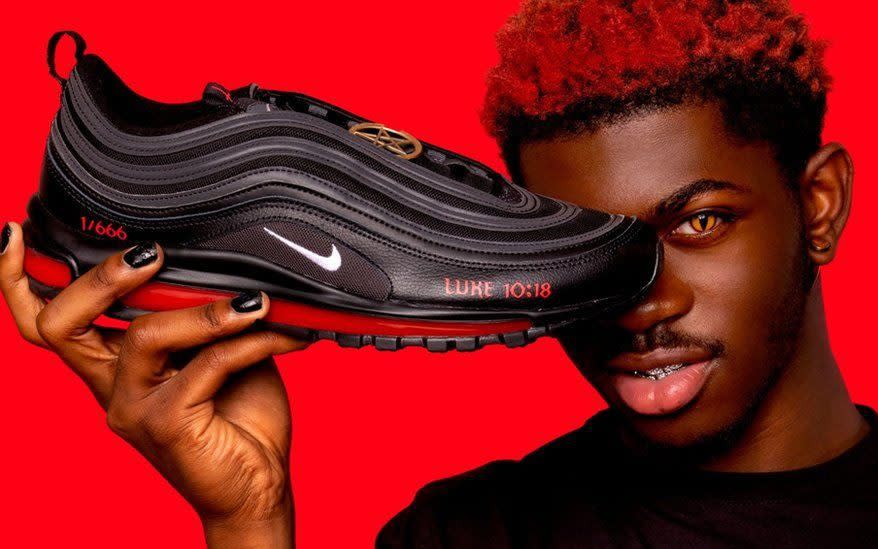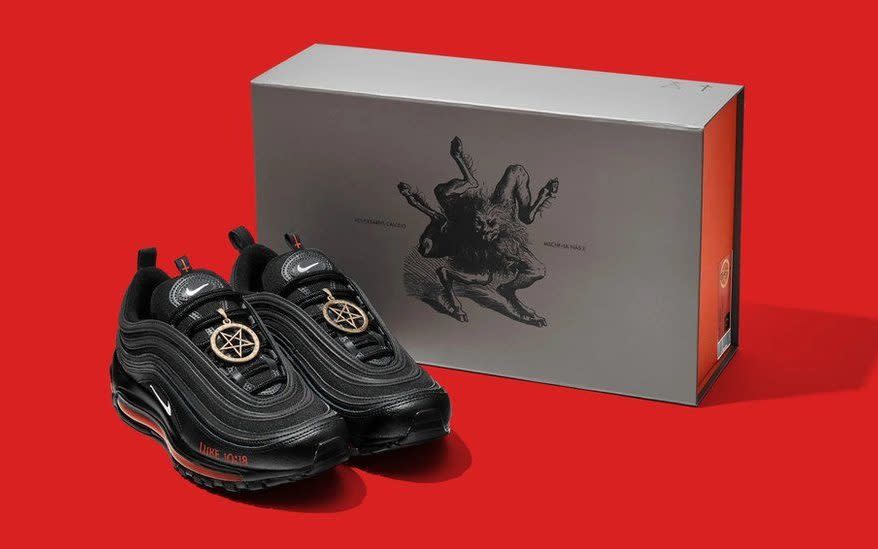Satan Shoes and rubber-chicken bongs: meet the mysterious ‘art collective’ MSCHF

- Oops!Something went wrong.Please try again later.
- Oops!Something went wrong.Please try again later.
Objects of ghoulishly impractical design are a staple of horror literature. A necromantic tract bound in human vellum? Passé. A telescope filled with the rotting ichor of hanged men? Yawn. How about a customised pair of Nike Air Max 97 “Satan Shoes”, with a drop of human blood in their soles? Now we’re talking.
That last one isn’t sub-MR James fan fiction. In fact, it’s the latest wheeze of viral marketers-cum-professional-provocateurs, MSCHF. Their advertising campaign for the devilish sneakers – fronted by the 21-year-old black, gay rapper Lil Nas X, whose 2019 single Old Town Road stormed the charts – has stirred a predictable dust-cloud of controversy. It has also had the distinction of uniting Right-wing Christians and global brands in condemnation.
South Dakota’s Republican governor Kristi Noem wrote on Twitter: “Our kids are being told that this kind of product is, not only okay, it’s ‘exclusive’. But do you know what’s more exclusive? Their God-given eternal soul.” And Nike failed to see the stunt’s amusing side: they are suing MSCHF for a breach of trademark.
The $1,018 (£740) trainers – limited, naturally, to 666 pairs – sold out in less than a minute when they were released on Monday. But are MSCHF’s actions an acute Baudrillardian commentary on the intersection of internet culture, social-media outrage and art? Or is it just trite agit-pop, as the group’s disdain for vowels may suggest?
“I think it’s one of the best marketing executions I’ve seen,” says Madison Campbell, CEO of Leda Health and expert on start-up culture. “I think it absolutely cuts through. Look at the stir and the noise it’s created. [Lil Nas X’s] followers and customers believe in the authenticity of what he’s selling. That’s him – love it or leave it, he’s not changing.
“And I’m assuming not too many Christians buy shoes from him, so maybe it’s not a huge loss.”

MSCHF has form with these kinds of stunts. In October 2019, they marketed a pair of “Jesus Shoes” – again a customised pair of Nike Air Max 97s whose soles contained a vial of water from the River Jordan blessed by a priest – which were priced at $1,425 and were one of the most searched-for shoes that year. Their previous pranks include an app that recommends stock investments based on your astrological sign, a browser plug-in that disguises Netflix watching as a Zoom call, and a rubber-chicken bong.
Some of their “drops” – released via a cryptic website and text messages that spark endless threads on Reddit – have a sharper political edge. Their website Zuckwatch, a password-protected site that looks like Facebook, was a smuggled critique of online privacy. And in 2020, Blue Monkey, a shell restaurant they founded, was shut down within hours. (It transpired that diners who thought they were placing food orders were in fact donating to insurgent political candidates.)
Run from a graffiti-clad warehouse in Williamsburg, Brooklyn, MSCHF is fuelled by “structured chaos,” according to its 31-year-old CEO, Gabriel Whaley. “My mom thinks we make toys,” he told the New York Times.

The startup, despite raising at least $11.5 million in venture capital since late 2019, studiously eschews corporate trappings. Founded in 2016 by West Point-dropout Whaley, its walls are plastered with mocked-up film posters with employees’ faces Photoshopped into them, and team meetings are held in a giant white pentagram stencilled on the floor. As of 2020, MSCHF had 10 employees, all in their 20s or early 30s. Only one is a woman.
“Being a company kills the magic,” Whaley told Business Insider recently. “We’re trying to do stuff that the world can’t even define. Our perspective is everything is funny in a nihilistic sort of way. We’re not here to make the world a better place. We’re making light of how much everything sucks.”
Is the outfit, with its bong-hit zaniness and stick-it-to-the-man posturing, the final death throes of tech-bro culture? Campbell thinks not. She sees their nose-tweaking stunts as illustrative of how millennial stars such as Lil Nas X and Billie Eilish have used social media to market their identity. Taking part in viral stunts is an astute way to control their public image – and sell records.
“We know rappers, singers, and songwriters count on several revenue streams which give them more control, revenue and equity,” she explains. “If we really knew the breakdown of Kayne West’s clothing line versus his music, what would we see? As a black queer artist, Lil Nas X's existence and visibility in most spaces is an act of resistance in a country deeply divided on the importance and equality of black lives and queerness.”

For his part, Lil Nas X has treated the controversy with evident relish. A few days before the Satan Shoes “drop”, he debuted a new single Montero (Call Me By Your Name). It begins: “In life we hide the parts of ourselves we don’t want others to see/ But here, we don’t." The accompanying music video is cartoonishly provocative. In it, the rapper slides down a stripper’s pole to Hell and gives a lap-dance to the Devil, before snapping his neck and assuming his horns. Lil Nas X's response to the online furore has been equally laconic – he tweeted a SpongeBob SquarePants meme.
Guerilla marketing is nothing new. As detailed by Ryan Holiday in Trust Me, I’m Lying: Confessions of a Media Manipulator, ‘viral’ happenings are often as artfully orchestrated as conventional, starchy press releases. Ikea has used Banksy-style street art to promote its brand, and drink-driving public-awareness campaigns have sprayed parking spaces around trees – “reserved from drunk drivers” – to highlight its dangerous consequences.
It can be taken further: Peter Jackson’s 2005 King Kong remake was advertised with gigantic banana-skins left scattered on rooftops, and Hot Wheels has transformed overpasses with apparent loop-the-loops. Indeed, artists such as Jeff Koons have long probed the boundaries between kitsch, commerciality and reproducibility. Andy Warhol’s endlessly replicated Campbell’s Soup print is an arguable forerunner of MSCHF’s Satan Shoes.
Yet while contemporary critics may have sniffed at Warhol's work, he never set out to offend. On the other hand, offence is the whole point in the case of MSCHF and Lil Nas X's collaboration. It is, after all, the one currency the internet truly recognises.
“What [they’re doing] is very interesting,” says Chris Moos, lecturer in organisational studies at Oxford’s Saïd Business School. "They are purposefully choosing to alienate one part of the community over another, and playing their sensibilities off against each other. There’s a growing number of young Americans who are not religious, and these shoes are a way of going against ideologies which have been imposed upon them in the past.”
In fact, Moos argues, the “product” MSCHF are selling is not the sneakers themselves. Rather, it is the great bow-wave of internet outrage and hype they have generated. It’s a trend that is increasingly common in the art market, he says. A purely digital collage by the artist Beeple, for instance, which was derided by critics, recently sold at auction for a record-breaking $69.3 million.

“We think of art as something physical, an artefact we can touch and see,” Moos explains. “But in the digital age, we create artefacts that aren’t necessarily physical. And there will be a growing market for purely digital cultural products.”
Nonetheless, MSCHF’s all-too-real gag looks like it will land them in hot water. Some customers have called for boycotts of Nike products because of their apparent association with Satanism. That potential loss of income and reputational tarnish is something of which the company will take a dim view, as the intellectual property attorney Zachary Silbersher told Vice.
“[They want] to send a message to everybody else that if you use that Nike ‘swoosh’ or its trademarks in a way that they don’t like, they’re going to come after you, and they’re going to be very aggressive about it. They’ll marshal all of the resources they have, and they probably have a lot more resources than you do.”
A telephone conference for that case has been set for June 29. MSCHF’s scrappy stand against corporate power looks set for an appropriately Biblical reckoning.

